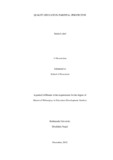
Please use this identifier to cite or link to this item:
https://hdl.handle.net/20.500.14301/207| Title: | QUALITY EDUCATION: PARENTAL PERSPECTIVE |
| Authors: | Luitel, Sunita |
| Citation: | Luitel,S.(2012).Quality education: Parental perspective. |
| Issue Date: | Dec-2012 |
| School: | SOED |
| Department: | DODE |
| Level: | M.Phil. |
| Program: | MPhil in Development Studies |
| Abstract: | The main purpose of this study was to explore the meaning of quality education from parental perspective and its relevancy and practicality in day to day life of students. It also explores the quality improvement process from the perception of heterogeneous group of parents. I have enriched my study with various literatures through in-depth literature review. A general, thematic and theoretical review of various literatures has provided a strong foundation for this study. The philosophy of my research depends upon multiple realities and ontological belief, subjective epistemological base and methodological blending. Within qualitative research paradigm the phenomena, context and knowledge have been analyzed and interpreted from different layers of participants to derive meaning from interpretative paradigm. The analysis, interpretation and reflection on quality education are based on the beliefs, understanding and experiences of the research participants. For this study I selected six heterogeneous groups of parents representing different professional background working in Kavre district. They include: street vendor, driver, farmer, shopkeeper, teacher and doctor who were selected purposively for the study. I had collected first hand data by using unstructured in-depth interview ii in natural setting which were rich and thick. The information was spontaneous from the participants due to close proximity, friendly rapport and interpersonal relationships. With the three basic research questions, I was able to derive information about the meaning of quality education, relevancy and practicality of education and quality building process in their social context and work environment. The study revealed that the parents who were from low economic background believed only in the high economic investment in education that assure the quality as well as relevancy of education. More parents believed in economic, academic and other physical factors as associated with quality and relevancy of school education. Interestingly, the parents from high social status believed quality education in inculcating and changing the behavior of the learner. Research participants focused more on social-character formation and also believed that the international branded schools have good social exposures and charisma. Furthermore parents blamed the existing education system for neglecting the different types of life skills and livelihood related manual or conventional works. The schooling system did not link students and learning to the society and labour market as it escaped from individual and social obligation and school curricula could not be practical in their daily lives. The education could not be contextual by integrating the indigenous knowledge and voice in class room and school interventions. So the education mainly focuses on memorization and perpetuates inequality in the society by reproducing the unemployed educated masses. There is a few hope of enlightenment but the majorities have frustrations associated with the current education. |
| URI: | https://hdl.handle.net/20.500.14301/207 |
| Appears in Collections: | Dissertations |
Files in This Item:
| File | Description | Size | Format | |
|---|---|---|---|---|
| Sunita Luitel (1).pdf | 726.71 kB | Adobe PDF |  View/Open |
Items in DSpace are protected by copyright, with all rights reserved, unless otherwise indicated.